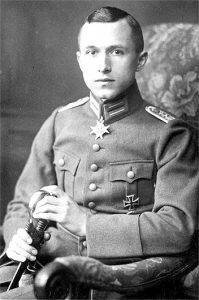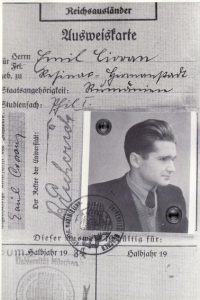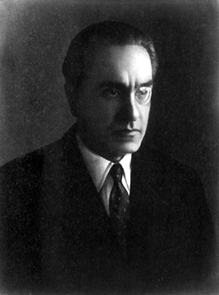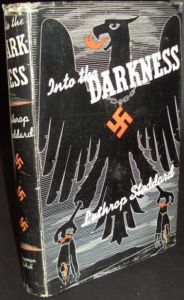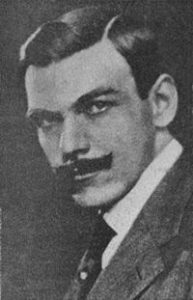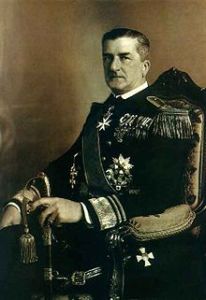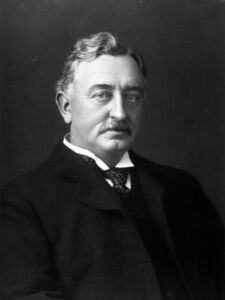I enjoyed Fred Reed’s April 24 essay “Ignorance, Its Uses and Nurture,” which refers to universal suffrage in anything larger than a small town as a “crackpot” idea. In a mere thousand words, Reed painted the American public as entirely incapable and unqualified to understand United States foreign policy, let alone vote on it. Therefore, he concludes, the entire democratic system is a sham. Yes, the statistics he presents bolster his point admirably. But maybe not as much as epic burns such as this one: (more…)
Tag: Third Reich
-
Hungarian translation here; Czech translation here
If I could choose to be anyone from the twentieth century, I would not hesitate for a moment to pick Ernst Jünger.
The man did just about everything it was possible to do in his time, and stretched the limits of what one individual can accomplish in a lifetime to their breaking point. His incredible lifespan alone (he died a month shy of his 103rd birthday) spanned the Kaiserreich, the German Revolution, the Weimar Republic, the Third Reich, the Federal Republic of Germany, and finally, reunited Germany in his final decade — and was active in all of them. (more…)
-
Hungarian translation here; Czech translation here
Audio version: To listen in a player, use the one below or click here. To download the mp3, right-click here and choose “save link as” or “save target as.”
If I could choose to be anyone from the twentieth century, I would not hesitate for a moment to pick Ernst Jünger. (more…)
-
March 20, 2023 Guillaume Durocher
Buddha a Führer:
Mladý Emil Cioran o NěmeckuEnglish original here
Emil Cioran
Apologie de la barbarie: Berlin – Bucharest (1932-1941)
Paris: L’Herne, 2015Špičkové nakladatelství L’Herne v roce 2015 vydalo velice zajímavý titul: sborník článků Emila Ciorana, otištěných před válkou v rumunských novinách. Cioran, později slavný aforista, byl i v době před spojeneckým vítězstvím bystrým pozorovatelem, kousavým kulturním kritikem a politickým analytikem. (more…)
-
Hungarian translation here; Czech translation here
Audio version: To listen in a player, use the one above or click here. To download the mp3, right-click here and choose “save link as” or “save target as.”
If I could choose to be anyone from the twentieth century, I would not hesitate for a moment to pick Ernst Jünger. (more…)
-
Übersetzt aus dem italienischen Original: “Sui presupposti spirituali e strutturali dell’unità europea.” Veröffentlicht in: Filippo Anfuso (Hrsg.): “Europa Nazione.” Rivista Mensile, Rom. 1. Jahrgang, Nr. 1, Januar 1951, Seiten 48–54.
Durch die Macht der Gegebenheiten ist heute auf unserem Kontinent das Verlangen nach europäischer Einheit lebendig geworden. (more…)
-
Part 2 of 2 (Part 1 here)
Then Stoddard describes the Hitler Youth and related organizations. Although there were some positive aspects to them, they also resulted in some regrettable family conflicts over politics stemming from friction with the churches, which didn’t want youths to be diverted into a secular organization. In that regard, making membership in the youth organizations compulsory was an overreach. (On the other hand, if we had an obligatory youth group like that today, then we wouldn’t have a wigger problem.) (more…)
-
3,135 words
Part 1 of 2 (Part 2 here)
What was life like during the Third Reich? An accurate picture is fairly difficult to arrive at, given the propaganda saturation persisting generations after the fact. Watching Hollywood movies won’t provide a balanced take, for obvious reasons. Neither will reruns of Hogan’s Heroes on late-night cable TV. War fever tends to fade as time goes on. Throughout the 1970s, I never heard anyone exhorting anyone to “Remember the Maine!” as if the Spanish-American War had ended yesterday, for example. (more…)
-
Miklós Horthy
A Life for Hungary: Memoirs
London: Hutchinson, 1956Thomas L. Sakmyster
Hungary’s Admiral on Horseback: Miklós Horthy, 1918-1944
Boulder: East European Monographs, 1994Historians of the Second World War and the events leading up to that catastrophe understandably focus on the “big powers”: Japan, Germany, Britain, the Soviet Union, the United States, and their leaders. (more…)
-
September 1, 2021 Collin Cleary
Gianfranco de Turris — Julius Evola: Filozof a kouzelník ve válce (1943-1945)
English original here
Gianfranco de Turris
Julius Evola: The Philosopher and Magician in War: 1943–1945
Rochester, VT: Inner Traditions, 2020Tento anglický překlad díla Gianfranca de Turrise Julius Evola: Un filosofo in guerra 1943–1945 přichází v příhodný čas, protože ukazuje, jak se velký muž vyrovnává se zhroucením společnosti i osobní tragédií. (more…)
-
6,080 words
Part I here, Part II here, Part III here, Part IV here, Part V here, Part VI here, Part VII.1 here, Part VII.2 here, Part IX here
The Superpowers Eclipse the European Nation-States
Despite the intense political rivalry among the European Great Powers, Europe in the nineteenth century managed to avoid the widespread destruction of the twentieth century’s two World Wars. (more…)
-
Hungarian translation here; Czech translation here
Audio version: To listen in a player, use the one above or click here. To download the mp3, right-click here and choose “save link as” or “save target as.”
If I could choose to be anyone from the twentieth century, I would not hesitate for a moment to pick Ernst Jünger. (more…)
-
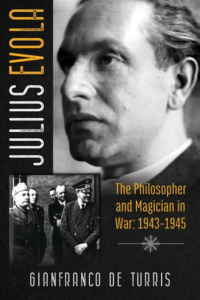
3,484 words
Czech version here

Gianfranco de Turris
Julius Evola: The Philosopher and Magician in War: 1943–1945
Rochester, VT: Inner Traditions, 2020This English translation of Gianfranco de Turris’s Julius Evola: Un filosofo in guerra 1943–1945 has come along at just the right time, for it shows us how a great man coped both with societal collapse and with personal tragedy. (more…)

